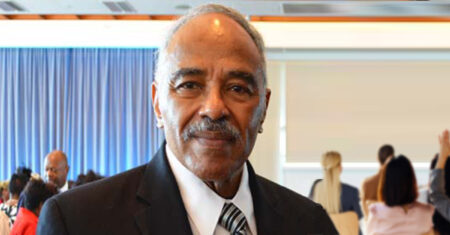In 2021, the National Newspaper Publishers Association (NNPA) launched a global news feature series on the history, contemporary realities, and implications of the transatlantic slave trade. Today, leadership in America is trying to erase this history. This is Part 6 in the series.
By Stacy M. Brown
Black Press USA Senior National Correspondent
Kunta Kinte: What’s snow, Fiddler?
Fiddler: Never you mind, boy, never you mind. Let’s get on back to home. I got enough trouble teaching you the difference between manure and massa. ‘Course there ain’t all that much difference when you gets right down to it.
“The first time he had taken the massa to one of these ‘high-falutin’ to-dos,” as Bell called them, Kunta had been all but overwhelmed by conflicting emotions: awe, indignation, envy, contempt, fascination, revulsion—but most of all a deep loneliness and melancholy from which it took him almost a week to recover. He couldn’t believe that such incredible wealth actually existed, that people really lived that way. It took him a long time, and a great many more parties, to realize that they didn’t live that way, that it was all strangely unreal, a kind of beautiful dream the white folks were having, a lie they were telling themselves: that goodness can come from badness, that it’s possible to be civilized with one another without treating as human beings those whose blood, sweat, and mother’s milk made possible the life of privilege they led.”
―Alex Haley, “Roots: The Saga of an American Family.”
“I still have a dream. It is a dream deeply rooted in the American dream. I have a dream that one day this nation will rise up and live out the true meaning of its creed, “We hold these truths to be self-evident, that all men are created equal.” I have a dream that one day on the red hills of Georgia, sons of former slaves and the sons of former slaveowners will be able to sit down together at the table of brotherhood. I have a dream that one day even the state of Mississippi, a state sweltering with the heat of injustice, sweltering with the heat of oppression, will be transformed into an oasis of freedom and justice. I have a dream that my four little children will one day live in a nation where they will not be judged by the color of their skin but by the content of their character…” —Martin Luther King, Jr.
The year was 1976, and America was still feeling the aftershocks of the Civil Rights Movement, the murder, some eight years earlier, of Martin Luther King Jr., and the end of the Vietnam War. King’s death, along with the murders of President John F. Kennedy and his brother, Sen. Robert Kennedy – both of whom were proponents of civil rights and equal opportunity for African Americans and other minorities – were reminders to many that America still had not come close to achieving the slain leader’s “Dream.”
What’s more, in 1976, author Alex Haley released his family’s autobiography, “Roots.”
It would not only go on to become a best-selling book, but a much-watched and talked about ABC Television mini-series that re-awakened everyone to the darkness, horrors, and inhumanity of the transatlantic slave trade. “Alex Haley tapped into something very special, the idea that black Americans have been, are, and will always be compelled to understand their history,” said Dr. Kellie Jackson, an assistant professor of Africana Studies at Wellesley University.
Jackson’s research focuses on slavery, abolitionists, violence as a political discourse, historical film, and black women’s history. That “Roots” spawned an era where African Americans would give their newborn children African-themed names was no surprise and counts as an important moment in self-recognition, said Jackson, whose new book, “Force & Freedom: Black Abolitionists and the Politics of Violence,” examines the conditions that led some black abolitionists to believe slavery might only be abolished by violent force. “For many African Americans, giving their children names with meaning is incredibly important. What’s remarkable about ‘Roots’ is that despite the master’s attempts to rename Kunta Kinte, ‘Toby,’ the name in popular culture and memory never stuck,” Jackson said. “Kunta Kinte is only referred to by his African name. I think this is a signal of the value African Americans place on names. In the 1970s and beyond, giving black children Afrocentric names provided not only a feeling of pride, but a sense of heritage in history.”
Jackson continued:
“Naming children after great rulers such as Nzinga, Kenyatta, or Chaka still resonates with many black parents today. I know parents who have given their children the name Obama. Names that are also signposts to historical moments. What’s more powerful than your name?” Still, those names come with a price because many agree that hate is as American as Apple Pie and baseball. And, victims of such hate not only include the once enslaved African American, but America is a country where it was once illegal for all women to vote. It’s also a country that not only devastated Native Americans, but today still prevents those living on reservations from casting a ballot despite the historic amount of bloodshed and despair brought upon that group. “I believe America does owe Native Americans the chance to cast a ballot,” said Shawn Halifax, a cultural history interpretation coordinator at the MacLeod Plantation Museum in Charleston, South Carolina. “I understand that what the law is and what people who are attempting to exercise their rights are told the law is, can be two different things,” Halifax said.
America has always had a system of discrimination and prejudice against all groups who were not identified as “White Anglo-Saxon” native, said Walter Palmer, the founder of the Walter D. Palmer Leadership Learning Partners Charter School in Philadelphia and current faculty member at the University of Pennsylvania, where he teaches urban studies, social policy, and practice. “Because historically American indigenous native’s language, culture, history, customs, and way of life has been wiped out and they have been a ward of the government, they lost their personhood,” Palmer said of Native Americans. “As American citizens, native indigenous people should be entitled to all the same privileges, rights, and entitlements as all other American citizens,” he said.
Palmer said America has continued to try to hold onto slavery, but in more legal forms like hate groups and prisons. “After the abolishment of slavery and the end of the Reconstruction period, there was the rise of the Ku Klux Klan, which was a replacement of the slave patrols after this period,” Palmer said. “America always used the prison system as a means of threat, intimidation, and social control, and this was later enlarged to use Chain Gangs and Jim Crow laws to further control the African Americans,” he said.
Palmer said “Roots” was built on the legacy of prior black historians over the past two hundred years, like Fredrick Douglass, William B. Dubois, Booker T. Washington, Marcus Garvey, G. Carter Woodson, Martin Luther King, and Malcolm X. “The connection that African Americans have had to the African Diaspora goes back to the ‘Back to Africa’ movement of the early 19th century, like the American Colonization Society, that was created in 1821,” Palmer said. For the 20th Century, “Roots” proved a watershed moment, Halifax said. “I imagine it inspired an incredible number of people to seek to learn more about their family’s past, because they knew little about it or had not been listening carefully to the stories of their elders,” Halifax said. “I think ‘Roots’ influenced some white Americans. I think the movie helped place the notion in the minds of many whites that enslaved populations were families and communities that experienced pain and suffering, that experienced joy and wonder, that were founders and builders of this country. That they were more than property,” he said.
Halifax continued:
“I think ‘Roots’ helped usher changes regarding the placement of African Americans within the context of our national history. Of course, this did not happen just because of ‘Roots.’ “In fact, I think ‘Roots’ was a crashing wave into America’s consciousness that had been pushed by a swell generated during the Civil Rights and Black Power movements that preceded it. Stories from America’s history were to be highlighted as “American History” and were decided by white male academics. “I think ‘Roots’ helped send a message. Historians needed to be more inclusive in their storytelling. It was during the 70s and 80s that more inclusive social histories were being researched and pursued in academia, and academia began to become more diversified. “By the 90s, museums and historic sites began recognizing that there is more to America’s story than just rich white guys, their families, and the wars they waged. And equally important, it was by then that people began demanding more of these stories. Unfortunately, following the crashing wave of Roots, there has been a very slow seep into the American conscious as a whole.”
“I think evidence of its importance is in the fact that its remake was released the same year as the opening of the National Museum of African American History and Culture,” Halifax said. “I suspect that was not an accident. We have a long way still to go. The study by the Southern Poverty Law Center on how Slavery is taught in American schools is damning.” Halifax pointed out that it took 100 years for the Smithsonian’s National Museum of African American History and Culture to open. To lesser fanfare and just before the opening of that museum on the National Mall, two other smaller museums opened within a few months of each other.
Both state that their purpose is to share the history of enslaved people and their descendants. Both are former slave labor camps, known euphemistically as plantations – the Whitney Plantation in Edgard, Louisiana, and McLeod Plantation Historic Site in Charleston, South Carolina. “As far as I know, they are the only two former plantation sites who have rejected the white dominated narrative, to look at these sites as places of memory for those held captive and enslaved and for those whose families survived,” Halifax said. “These two sites hold promise as places of healing where slavery, its legacy, and American racism can be examined. In the end, I think Roots has had an important and lasting impact.
Up Next: From Enslavement to Mass Incarceration






